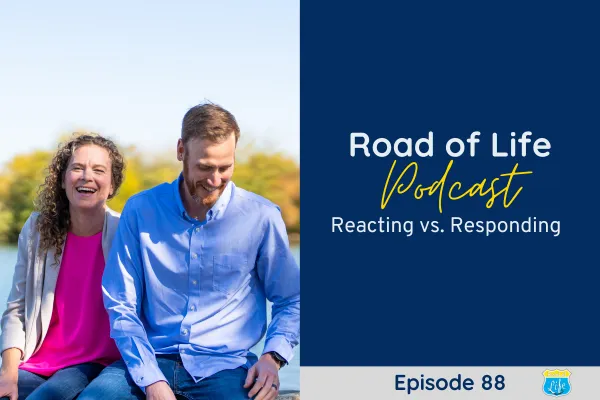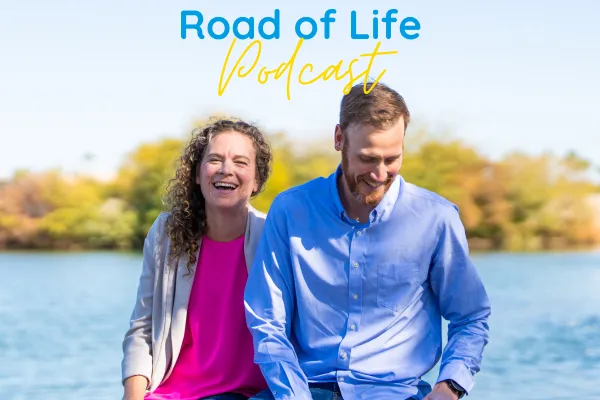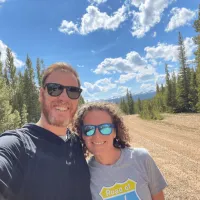
The
Road of Life
Podcast
With Meredith MacKay & Craig Bennett
Listen

88.Reacting vs. Responding
Listen Now
Episode Transcription
Welcome back to another episode of the Road of Life podcast with Meredith and Craig this week. We've got an interesting episode. Yeah, this has come up well, like literally, I've talked about this two times, two today on coaching calls. Wow. Two times. So this is, something that's coming up a lot lately.
The difference between reacting. And responding mm-hmm. In your relationship and how to stay cool and in control versus letting your emotions take control, because that's gonna be the difference when you're in a conflict or in a, situation. How you react or how you respond is gonna be the difference in the impact of that situation on your relationship.
It's not the situation itself. It's how you choose to react or respond to it.
So what's the difference? Reacting is the emotional side. Mm-hmm. It's emotional, it's instinctual, and it happens without a lot of thought. It's when you let your emotions just take takeover. They're the driver and you are the passenger. Correct. Which. Is the opposite of what we want usually. Yeah. It's when you snap at your partner when they say something like, if you say something that frustrates me and I immediately snap back at you.
That's me In a reacting state. Rolling your eyes. Yeah. When they say something that you don't agree with or if you yell at them or give them some sort of sarcastic response. Yeah. That's reacting. So is shutting down the conversation like stonewalling hard, like we're not having this conversation.
That's an emotional reaction. You're letting your emotions drive that. Lashing out when you feel attacked or getting really defensive, storming outta the room, mid-conversation. All of those things are letting your emotions drive the car. It's basically your fight or flight. Yeah. Taking action. And it's, about protecting yourself versus finding resolution.
Yeah. So it's about, protecting whatever it is. Maybe it's your ego, but it's about just shutting down. Letting the fight or flight take over mm-hmm. And not about getting to a solution. Mm-hmm. Whereas responding is intentional, like almost strategic. It's thoughtful, it's controlled. It's about pausing and managing the storm that's going on inside, managing the emotions.
So you can feel your emotions without letting your emotions drive the car. So responding. You are driving the car and your emotions are in the passenger seat. Yeah, it's like letting your prefrontal cortex take over, like the higher order thinking versus letting your reptile, your crock brain just completely do whatever it wants to do in the moment.
And responding can look like taking a deep breath, counting to five, and then calmly saying. I'm feeling a little frustrated right now. Can we talk about this a little bit more and just calmly letting your emotions go to the backseat? Mm-hmm. It can also be, I need a few minutes to collect myself to process this before I can.
Productively engage in this conversation. Yeah. Before I can respond, I just need 15 minutes. Mm-hmm. I'm gonna just go clear my head, take a walk. Mm-hmm. , rather than lash out and say the thing that maybe your emotional side wants to say. You just, I need a minute. I'm gonna take a minute.
Thank you. , and then come back with a clearer head. It also looks like. Validating their feelings. Even if you don't understand them, even if you don't agree with them, if they're coming at you with something emotional or something that they're sharing with you, you may not get it and it may piss you off.
It's not about you. Yeah. It's just really important to understand that you don't have to get somebody else's feelings or agree with them. , for them to have them. Mm-hmm. They have them and it is what it is, and so rather than fighting them on it. It's just better to, you know, understand that they're having them.
Mm-hmm. They're a human being and they're quite, you know what's the word I'm looking for? I guess the word I'm looking for might be they deserve them. Mm-hmm. Like, as they're entitled to their feeling, you're entitled, they're entitled to them.
Whatever it is, is they're a human being and they have these feelings, they're entitled to 'em. You don't have to agree with them. But you do have to respond in respectful. Way if you want to have a good relationship. Yeah.
Reacting is about impulsivity and responding is about intention. Reaction escalates or creates conflict and responding escalates or builds trust. Mm-hmm. It's interesting, I just watched a video that someone in our community shared. And it was a parenting video, but it talks about this exact scenario and I thought it was really helpful.
And this parent, his mother was getting some criticism, are you just gonna sit there and do nothing? 'cause their kid was obviously having a thing, no meltdown. And the mom was like, first of all, drop the, just because sitting here. Calmly in the middle of this shit storm is actually a very sophisticated technique, and if I'm showing calm and not reacting, I'm responding and I'm, showing calm on the outside.
It's because on the inside I'm doing a lot of work to manage my emotions. The storm is on the inside. Yeah. I'm weathering it on your behalf. Right. As opposed to if I completely blow, 'cause I'm frustrated and overwhelmed and my kid is going bonkers and I blow. I've done no work on the inside. It's all just coming straight out and now everyone's weathering this storm, correct.
So I, thought it was a really great explanation for me that I'm just sitting here and not responding, or I'm just sitting here and not reacting. Does not mean I'm not doing anything. It means I'm doing really hard work on the inside to manage my feelings and my emotions so that I can respond in a way that's going to be constructive and productive to the situation as opposed to escalating the situation.
It's such a, really good example of how responding not reacting is such a strength. Mm-hmm. Because. It's your taking on the responsibility of, weathering all of those emotions that are going on inside of you rather than spewing it out mm-hmm. For the world to also have to deal with.
Correct. First of all, it's a, it's a huge strength. , when you're capable of taking that on yourself and not putting it on the world. Mm-hmm. But it's also such an act of selflessness. Yeah. Huge. It's such an act of selflessness. It's like. I'm not going to.
I know what's going on inside me right now. All these emotions and all of the, and I don't wanna react and put that on you. Mm-hmm. So I'm going to take a minute, I'm gonna respond, I'm going to breathe through this. , and I'm going to respond in a healthy way so that we don't both have to deal with this.
Correct. Because it's mine to deal with. Right. And I shouldn't put this. , you shouldn't have to deal with my stuff. Right. 'cause it's interesting 'cause , we react based on our emotions, based on our feelings. And our feelings come from our thoughts. And we have a gajillion thoughts a day.
The majority of which are not productive. And if you reacted to every thought you've had, you'd be a crazy person, right? Like the things that you would do. Yeah. Insanity. Most of the thoughts we have. Are not helpful. Not helpful. Not helpful. Not even who we actually are, aren't what we actually believe.
There's a lot of really negative, unproductive thoughts that we have in the run of a day. The world would be utter chaos if everyone acted on every single thought they had. Right. It would be anarchy. Correct. And so that's what, reacting creates in your, world. Yeah. Yeah. So you're having feelings based on your thoughts that aren't necessarily productive.
Or constructive for your life. So you're having thoughts that aren't helpful and then you get your feelings come up based on those thoughts, and then you instantly react to those feelings, even though those thoughts had no basis in reality anyway, they're just thoughts that you made up in your own brain.
And so when you do react like that, it impacts your relationship. Yeah. Well, we already talked about the first it escalates conflict. Mm-hmm. There's, no example of any situation where if someone comes at you with something that creates a reaction inside of you that you immediately let out, that it makes everything better.
Also, that they're not also probably going to react, and then you're piling on top of each other. React. React, react, react, react. Yeah. Reacting also breaks trust. Reacting , can make the other person feel attacked, feel dismissed, feel unsafe, and that is going to erode trust over time. And how much likely are they to ever come to you with something, a problem or anything?
If that's the reaction that they've gotten in the past. Mm-hmm. They're not, , you're completely disconnecting, you've broken trust and you're completely disconnecting. Yeah. But it also leaves you feeling pretty crappy. Yeah. It can start a shame spiral. Mm-hmm. Like when you. React, and this is the conversation I had today with someone.
When you react in the moment, , it just bubbles out of you. Like it just explodes out of you. And then later when you've had a bit of time to, reflect, you're like, why did I say that? I didn't, actually think that, or I didn't mean to say it that way. I didn't want it to , come out.
That mean that's not what I actually wanted to say. So you, end up in this shame spiral where you feel so shitty about yourself. That reinforces all these negative thoughts that you have and then these negative feelings, which causes you to react again. And then that which is self-sabotage.
Yeah. Big time, right? Yeah. You just start to like pile on and it starts to impact other relationships and other areas of your life. And then you completely start to neglect your health because you're so bummed out that you start eating your feelings. Mm-hmm. And then not going to the gym, and then you lash out because you feel bad about yourself and you lash out to the next person and it's just a.
Self-fulfilling prophecy, sabotage relationships. 'cause you don't feel worthy of them. Yeah. And it's just a snowball. It keeps building, running downhill. Yeah. So let's look at the flip side. What is responding? What's the impact of responding on a relationship? It deescalates? Yeah. The. Tension, the issue that's going on.
Yeah. Instead of escalating conflict, it does the opposite. Yeah. When you can respond calmly, it just sets the tone. So the other person's defenses come down. They don't. Mm-hmm. Feel on edge. They don't feel like they're in attack mode. Mm-hmm. So neither us, their nervous system can settle too.
Yeah. We're both chill. We, neither one of us is in attack mode and then now we can have a productive discussion on how we're gonna navigate whatever this is like. Sharon Lecter always says, high emotion, low intelligence. If you are both in fight or flight. And you're both reacting,
forget about it. Take a break. Yeah. What else does responding do? Well, it builds trust instead of breaking trust. Right, right. The opposite of what we talked about. It builds trust and emotional safety, and you can show up and show your partner that you care about their feelings and value the relationship more than being Right.
Then it allows them to trust you and understand that you are a safe space. Mm-hmm. And then when things come up for them in the future, they're more likely to come to you. They're more likely to come to you. Yeah. Which creates a deeper connection and intimacy for you, and you're also more likely to actually resolve any issue, like resolution of the conflict is likely to happen when you can manage your feelings and respond productively than when you just blow at the other person.
Like if you actually wanna resolve the issue, reacting is not going to get you there. And I know it's hard in the moment for sure. Actually, let's talk about that. How does it look and feel in the moment?
It just reminds me of a story that we've told in other episodes, but, we'll, say it again here because I, think it's really a, great example of the difference between responding and reacting. ' cause you took a weekend trip with your girlfriends and , you were basically, you know. I asked you, you know, what'd you get up to?
Were you just chit-chatting with your girlfriends? And you didn't love that? No, I took it as you dismissing talking down. Yeah. And so 'cause and you got my body reacted. Your body reacted. You didn't verbally, I didn't, react, but my body reacted well. Yeah, you didn't verbally react, but physically there was, something that I picked up on and I was like, mm.
So what's happening here? I noticed a change in the old body language there, big dog. Where are we going here? And that was a, response to my reaction. Right. And then we were able to have a conversation. Mm-hmm. Then you responded with, well, big dog, this is how that made me feel.
This is what I took from that. Mm-hmm. And then we were able to, resolve it, to get to the bottom of this because, you know, we'll ask you questions around, you know, normally when you go on these weekends, you tell me that you just chit chatted, and that's true. And so I just was using your language. I thought, you know, but I, I hear it differently when I say it than when you say it.
Apparently. Apparently. But we were able to get to that place. Mm-hmm. Had you reacted and then had I reacted and then you would've reacted some more. Mm-hmm. And then we would've been in a conflict and probably never ever really got to the root of it. Root of why mm-hmm. Something happened there. Mm-hmm.
And never really learned. And then we wouldn't be able to tell this story. Mm-hmm. Over and over again. It's a great story. It's, a example, a small example. But it's a good example of. Just leading with curiosity, responding versus reacting, giving the benefit of the doubt. Mm-hmm.
Like it has all of those for sure. Elements that, it's such a great example that, yeah, it comes up every now and then and it can be a tough transition, reacting to responding if you've been conditioned your whole life to react. 'cause that's what you learned growing up and that's what you've done for your whole life.
Going from reacting to responding is not an easy path to, transition from into a new one. , our friend Becca talks about the example of using potty training as, an analogy when you're trying to change your behavior, like a baby just pees and lets you know after 'cause they scream or they tell you eventually that like, I peed, I'm wet, whatever.
When you're trying to potty train, you're taking them from, I peed to, I'm peeing like crap. I know when the moment that what I'm doing is not what I want to be doing, but I can't stump myself to. Backing them up even further to, I need to pee. Like I feel like I wanna react, but I'm gonna respond instead.
That's the ultimate. So you're trying to back up from, I peed to, I'm peeing to, I need to pee. So you're trying to go from, I reacted to crap, I'm reacting to, I feel like I wanna react, but I'm gonna respond instead. And it's not an easy transition to make. And so what you saw in that story was me in the middle of my transition because.
I grew up learning how to react and my body reacted, but I didn't say anything. Yeah, that's true. So I was peeing in that moment. I'm peeing, I'm in the middle of my transition. I'm trying not to react. My body's betrayed me, but I'm working to respond.
That's a really good example. Thank you. So I think we all have gathered so far that reacting, like what does it look and feel like in the moment? Like it comes with a rush of emotion, intense emotions, anger, frustration, overwhelm, annoyance, fear. Probably it feels like you're on autopilot and you have no control. Physical signs, increased heart rate, clenched fist.
Clenched stomach, tight, jaw raised voice, for sure, probably. But emotionally, feeling defensive, feeling attacked, feeling overwhelmed, feeling outta control, I think it's really important to understand that as you're making the transition from, I peed to, I'm peeing to, I've peed, or I need to pee. I need to pee. Yep. It's really important that, that doesn't happen overnight.
Mm-hmm. , that's a transition that happens, but it's not overnight. And as you're making that, and sometimes you slip up and you pee. Mm-hmm. That it's, not about being in shame for it. Mm-hmm. It's really having grace for yourself that you're on a journey and that you're changing and becoming a better version of yourself and improving for your relationship and for yourself.
So when you do accidentally pee, accidentally react instead of respond. Right. Have grace for yourself. Mm-hmm. Or for your partner. Or for your partner and just. Endeavor to do better. Mm-hmm. Move on from it. Learn from it, but don't stay in it. Mm-hmm. Totally. well, let's just jive into the, how to, make that transition.
Like we talk that it's hard, we talk about giving ourselves grace for it, but what is it, , how do you unlearn something that you've been so deeply conditioned to do to then do it differently? It's really hard. It is. I think the first, thing is to understand what sets you off. Yeah. What are your triggers?
Yo understand what is it that is going to make you react. Mm-hmm. What makes you want to react and find those things and really understand why, I guess, what those moments are, what they mean for you. Yeah. Mm-hmm.
Then when you're feeling that, then it's all about P. Then you have to pause. Yeah. So it's like, oh, cool. I found one. Take a second. I found a trigger. Yeah. Then take a second. Whew. Take a beat. Time out. Pause when you feel, because it's almost like this, like red wave rising inside of you. When you feel that emotion rising up, time out.
Take a pause, take a deep breath. Count to five or seven or 17 or 20, whatever you need to. To give yourself a moment to collect your thoughts. We're trying to avoid reacting in the heat of the moment, so give yourself time to cool and let that pressure sort of go down just a little bit. And then once you give that pause, then you want to regulate.
Mm-hmm. You wanna bring your emotions down, you wanna do things like grounding, getting into your body and like do the five senses, like what do I smell, what do I see, what do I taste? What can I feel? What do I. Here right now. Mm-hmm. In the moment. Mantras can be really helpful. Yeah. Brings you into the present.
We just wanna get out of our heads in the emotions and just get back into our bodies and get into the, present moment. Even a hot shower, like a quick hot or cold, either one shower will really put you back into your body. Breathe. Breathe. Yeah. And then once you've processed, managed that emotion and you don't feel like you're on the edge of the cliff, ready to.
Jump ready to blow. Then what do you do? Get curious. Lead with curiosity like you did in the park, kind of like in the example in the park. Yeah. Mm-hmm. Lead with curiosity. It's like, okay, I'm sensing some tension here, so big dog, what's going on? Mm-hmm. And that's leading with curiosity is like mm-hmm.
Instead of defensiveness, where you could have said like, what the F's your problem. What's your deal? Yeah. Why you like this? Yeah. , what's your problem? What are you going, whatcha getting on with? Yeah. Yeah. It's, just leave with curiosity and try to like really care about what is going on with the other person and just leave with curiosity.
Like, I'm sensing something's off. Mm-hmm. What's happening? What's going on with you? Like, start with empathy. Mm-hmm. Like, assume that. If they're coming from a good place and that they want this resolved and there's something holding them back. Yeah. Assume the best in them. Yeah. Give them the benefit of doubt.
What's going on? What's going on? I'm here, I want to help. Mm-hmm. Let's talk about it. Mm-hmm. And it helps to practice this in lower stake situations. Yeah. , you definitely don't want the first time that you're gonna start this in an actual situation where the emotions are high and you want react like.
You wanna have these conversations ahead of time. Mm-hmm. So like, the next time your partner forgets to bring home the milk, instead of , however you would normally react to that. Do a five second. Like, you forgot the milk again. It's like, you must had a busy day. What, what was going on? Mm-hmm.
Like, pause, breathe, do what you gotta do, and then leave the curiosity. Exactly. And then, like you said, when you're in the process of going from, I peed to, I'm peeing to, I need to pee. There's gonna be accidents. It's the messy middle. That's when the kids pee on the floor. You're gonna pee on the floor.
There's gonna be times where you screw it up, you're gonna react, give yourself grace and learn from it. When you want it to respond, it happens. You're a human being. Human beings make mistakes. We all do. Don't shame. Spiral yourself. That's the important part. Mm-hmm. Is don't let it spiral. Don't let it spiral.
So reacting versus responding is a critical, if not, I think the hardest skill to develop in a relationship. If you haven't learned it growing up, if you learned reaction and you grew up with reaction and you've done your adult life with reaction, and let's be honest, 99% of us probably have totally, it's really hard to rewire your brain to respond.
It's worth it. It's very, very worth it in your relationship, but it's not easy. So big question for you. What's the one thing you're gonna do different? What's the one thing you're gonna take? Maybe you're a great responder, you are an excellent responder, and you don't react. You're a responder, but maybe your partner's a reactor.
So maybe you share the episode, maybe you give them a little more grace. When they do react, maybe you work together on grounding and managing emotions in the heat of the conversation. Anything, find one thing. To take away from our conversation today to actually put into practice. How are you going to respond?
Great question. And on that note, share this episode with a friend or with your spouse, or with someone who it would benefit, which let's be serious, is 99% of the population and we will see you next week. Love you. Bye bye.
Before we wrap up, we just want to remind you about something really special we've created. The Infinite Relationship Mastermind. It's like a VIP backstage pass for anyone looking to level up any and all of their relationships in their life. And we're not just talking about the relationship with your spouse.
Though it does include that one. We're also talking about the relationships with yourself, your friends, your business partners, your family, all the important people in your life. This mastermind is for anyone ready to take all of their relationships to a whole new level. Whether you're thriving and you want to thrive even more, or you're feeling a little stuck and need some extra love and support.
We host exclusive live courses. We create a safe, no judgment space where members can just open up and honestly just have a ton of fun connecting with other amazing people who are, building stronger, relationships. And to be honest, the transformations we've seen are incredible and it's exactly why we do what we do.
It fills our heart like nothing else. Now, we are super protective of this community because it is all about trust, love and support. So it's not for everybody, but if this does sound like it might tickle your fancy, then check out the link in the show notes and reach out to us if you have any questions, we'd love to chat and see if it's a fit for you.
And as always, thank you so much for being a part of our journey on The Road of life. And remember, you've got this, and we're here to help you every step of the way. So we'll see you next week. Bye for now.

Meet
Meredith & Craig
Life partners, business partners, and best friends. We left the corporate grind to become fulltime entrepreneurs... with no idea what we were doing.
That made for some interesting, amazing, stressful, awesome, painful, scary, awful, awesome, insightful, unbelievable decisions, moments, experiences, relationships, and quite honestly, we wouldn’t have it any other way.
Our marriage is the foundation for everything else we build in our lives. It is a cheat code for life, and we believe that having that part dialed in levels up every other part of life.
We help others live their dream life... and that starts with a rock solid relationship so they can level up the rest of their lives too.
Tune in for a dose of laughter, love, a gentle ass kicking, and game-changing wisdom that will help you unleash your potential and build the life of your dreams together.










